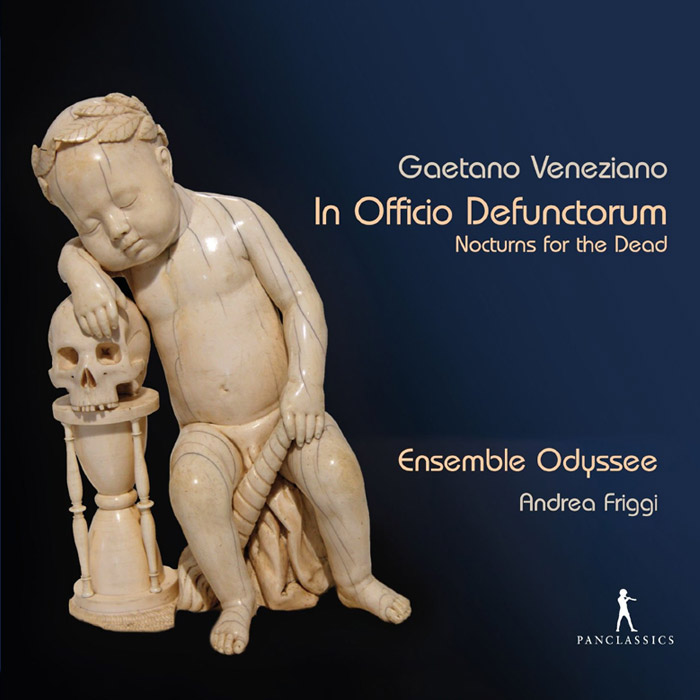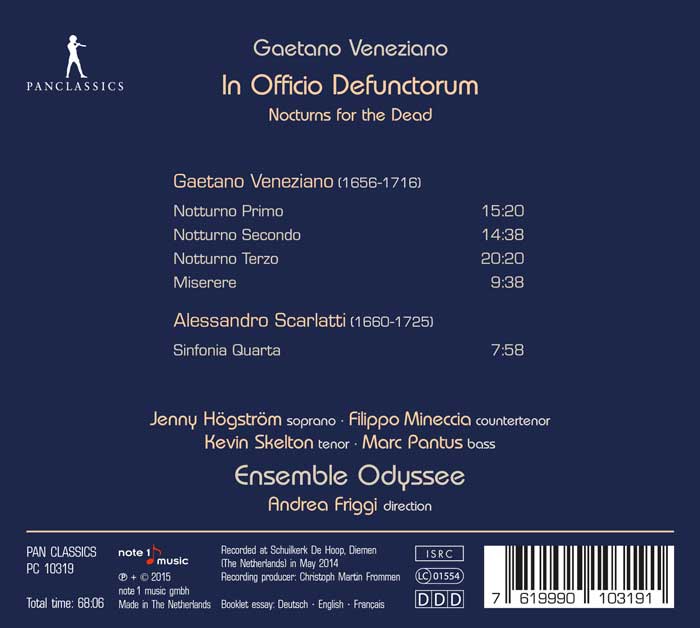Share This
Album at a Glance
Tags
Related Posts
Gaetano Veneziano (1665-1716): In Officio Defunctorum - Nocturns for the Dead / Ensemble Odyssee
Posted by George Adams on Jul 30, 2015 in Baroque | 0 comments
Ensemble Odyssee’s album of music by Gaetano Veneziano (1656–1716) and Alessandro Scarlatti (1660–1725) is as much about the group and their approach to performance as it is about the composers and music they’ve chosen. That is, when an ensemble champions the work of a composer, they put both that composer and their own musical knowledge and taste on display. This is the relationship Ensemble Odyssee has with Veneziano, whose music they have recorded previously on the Pan Classics label. Here they continue to perform his work with dedication and energy. Their thoughtful approach is immediately evident in their clarity and precision, but really comes through in their depth of understanding of the music.
The group worked with all of the available sources for Veneziano’s sacred “Notturnos,” sets of lessons and prayers to be performed early in the morning before the sun has risen. In some cases the ensemble had to compose parts that were missing, or make interpretive decisions based on the surviving manuscripts. As a whole, it seems the group is careful but bold, unafraid of the field of early music performance that is at times stifling to creativity and expression. These three sets of three lessons each are of the Officium Defunctorum, or the Office of the Dead—not a proper requiem, but rather a set of works that would have been sung whenever a nobleman died. It is unclear whether they were meant to be taken together as a complete set, but certainly work well as such.
Two additional works are included here: Scarlatti’s Sinfonia Quarta, a very short, five-movement instrumental work for strings and winds; and a four-part Miserere by Veneziano. The former feels a bit out of place in the midst of all this rather severe sacred vocal music. It is relatively light-hearted and fleeting, a small musical tidbit by a composer with an imposing presence. Indeed, some suspect that Scarlatti’s 100 operas may have prevented Veneziano from composing in the genre while he was also living in Naples. On this record the tables have turned, and Veneziano’s work greatly outweighs Scarlatti’s, both in substance and in quantity. The Miserere is a fitting conclusion to the recording, touching upon the theme of death with its Requiem text. Voices are doubled by strings and organ for a richer texture, lending to the music’s gravity. The piece slowly grinds to a halt, pleading for mercy.
Ensemble Odyssee combines a knowledge and respect for early music with a fresh enthusiasm that makes this music exciting and haunting. Their performances of Veneziano’s Notturnos are cause for optimism, and I look forward to the group’s future recordings. For now, this record is an opportunity to hear music that is otherwise very difficult to find.
Among the many students in search of a good musical education, a certain Gaetano Veneziano moved to Naples, then among the hotbeds of musical life in 17th c. Europe, from his native Apulia at age ten to study in one its cities' four music conservatories.
In addition to a Miserere for 4 voices and a Sinfonia Quarta by his contemporary A. Scarlatti, this Pan Classics release presents three late 17th c. ‘In Officio Defunctorum’ (part of the normal repertoire of every church and performed every time a nobleman died), the texts being set to music by this imaginative, late-Renaissance Italian composer.
Source: Naxos
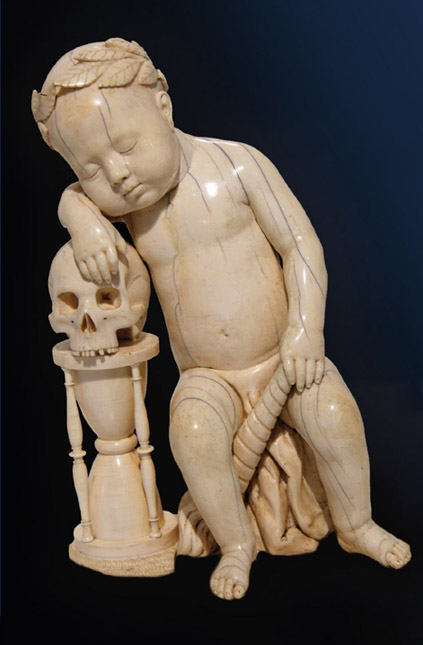 From Album Artwork |
Gaetano Veneziano, composer Gaetano Veneziano (Bisceglie, 1665 – Naples, 15 July 1716) was an Italian composer. His son Giovanni Veneziano was also a composer. Veneziano senior studied with Francesco Provenzale at the Conservatorio Santa Maria di Loreto in Naples in 1666; where in 1684 he became maestro di cappella. He defeated Cristoforo Caresana in a competition to succeed Alessandro Scarlatti as master of the Spanish royal chapel of Naples in 1704, but after only three years lost the post when the Austrians took control of Naples from the Spanish in 1707. Source: Wikipedia |
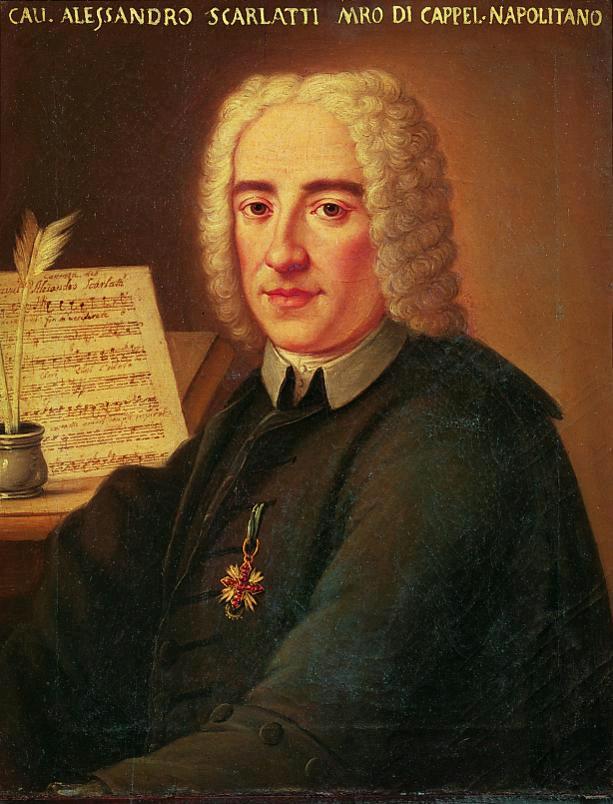 Alessandro Scarlatti |
Alessandro Scarlatti, composer Alessandro Scarlatti (2 May 1660 – 22 October 1725) was an Italian Baroque composer, especially famous for his operas and chamber cantatas. He is considered the founder of the Neapolitan school of opera. He was the father of two other composers, Domenico Scarlatti and Pietro Filippo Scarlatti. Scarlatti’s music forms an important link between the early Baroque Italian vocal styles of the 17th century, with their centers in Florence, Venice and Rome, and the classical school of the 18th century. Scarlatti’s style, however, is more than a transitional element in Western music; like most of his Naples colleagues he shows an almost modern understanding of the psychology of modulation and also frequently makes use of the ever-changing phrase lengths so typical of the Napoli school. Source: Wikipedia |
 Andrea Friggi |
Andrea Friggi, ensemble director Andrea Friggi was born in 1979 in Milan where he earned his first doctorate in 2003 in philology (Greek paleography) from the Università Cattolica del Sacro Cuore under the guidance of Carlo Maria Mazzucchi. He also earned a PhD in Byzantine philology from the University of Turin in 2007 under the guide of Enrico V. Maltese. He is active as a scholar and has published a number of articles. He has studied organ, harpsichord, and continuo. Among his teachers are Edoardo Bellotti and Stefano Demicheli. He also attended masterclasses with René Clemencic and Luigi F. Tagliavini. In 2007 he moved to The Netherlands to study with Menno van Delft at the Conservatorium van Amsterdam where he graduated in 2011. Following his BA graduation he continued his studies in Amsterdam with Bob van Asperen and Richard Egarr and obtained a Master degree in Basso Continuo Specialization in 2013 with Thérèse de Goede. Source: Artist Website
|
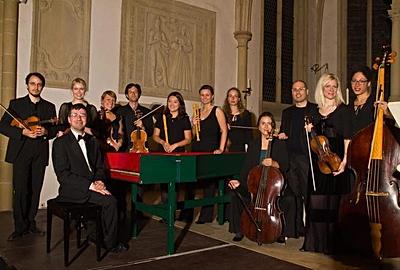 Ensemble Odyssee |
Ensemble Odyssee Founded in 2009, Ensemble Odyssee is a collective of young baroque musicians who seek new interpretative paths in early music. The group was founded in 2009 by Anna Stegmann (recorder) and Andrea Friggi (harpsichord). Together with core members Eva Saladin (violin) and Georg Fritz (recorder/oboe), they combine significant expertise in historical performance practice with experience in bringing new repertoire to light. Source: Artist Website |
![]() About George Adams
About George Adams
Twitter •
| Thinking about purchasing this album?
Follow this link for more album details or to make the purchase. Buy it now |
“Not just recommended. Guaranteed.”
We stand behind every album featured on Expedition Audio. Our objective is to take the monetary risk out of music exploration. If you order this album from HBDirect.com and do not like it you can return it for a refund.
Gaetano Veneziano: Sonata | Ensemble Odyssee





